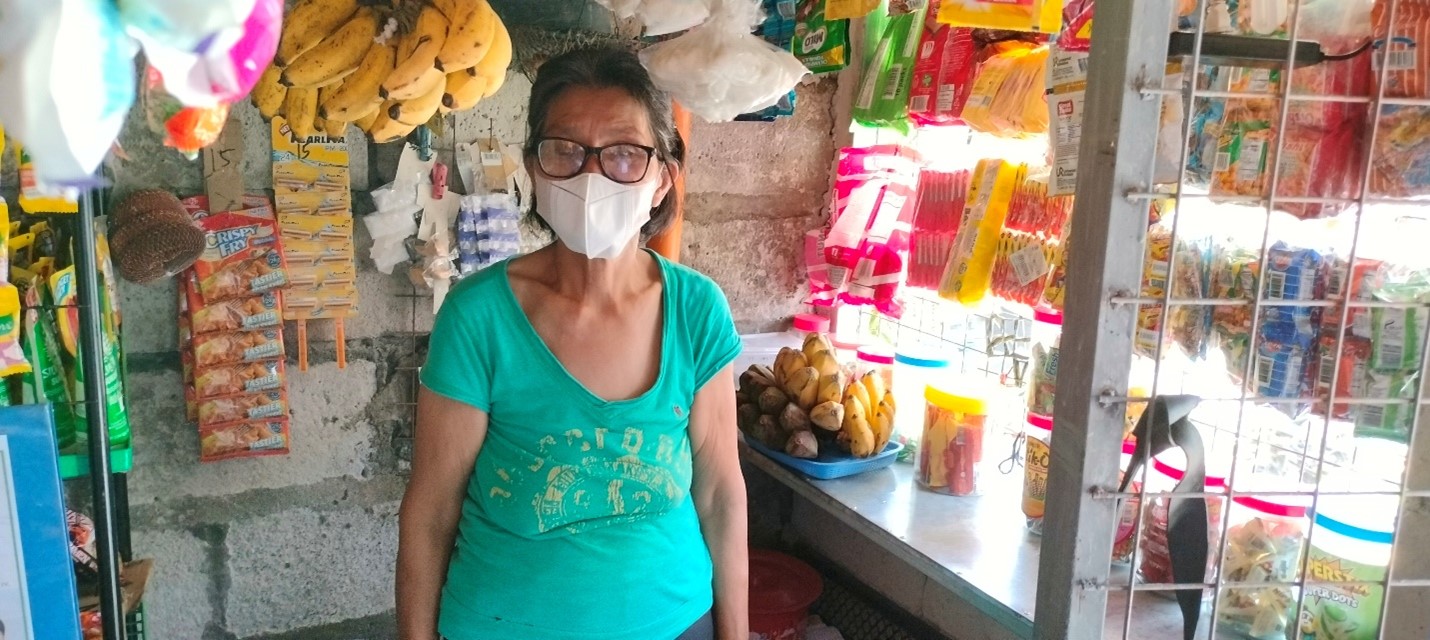“Kapag umuulan sa Metro, lagi kaming nababasa dahil puro karton lang ang laman ng sahig namin. Kapag may demolisyon, kinukuha nila ang lahat sa amin kasama na ang aming mga damit at maging ang mga kaldero na may nilutong kanin para umalis kami sa tulay.”
This is how Deobili described their most difficult experiences while living under a bridge in Sucat, Parañaque.
Deobili, a senior citizen, takes care of her two grandchildren, a 10 year old boy and a 9 year old girl. She raised them since they were born because their mother was sent to the National Center for Mental Hospital for mental health rehabilitation, while her son Gerry, the children’s father,became dysfunctional after leaving Deobili and his 2 children in the streets.
“Kinailangan kong gumawa ng paraan para makapagbigay ako ng pagkain para sa aking mga apo. Alas singko ng umaga, nasa subdivision na ako para maghanap ng ‘malunggay’ habang tulog pa ang mga apo ko. Minsan nagbibigay ako ng kaunting halaga sa may-ari, pero kadalasan ay binibigyan nalang niya ng libre. Tapos Ibebenta ko ang ‘malunggay’ sa palengke ng Bonifacio.”
Deobili also engaged in domestic work such as laundry and housekeeping, but many of her clients refused her because she had to bring the two children at work.
Despite her efforts to provide for the daily needs of her grandchildren, her income is still insufficient to buy even their basic needs like food, water, and clothes.
“Marami talaga kaming pinagdaanan. Wala kaming anumang damit na isusuot; binigay na lang sa amin ang kalderong ginamit namin sa pagluluto. At kadalasan, hinihintay na lang namin na bigyan kami ng mga tao ng pagkain mula sa mga dumadaang sasakyan. May mga pagkakataon na natutulog kami sa gabi nang walang laman ang tiyan,” she added.
Nonetheless, Deobili remained positive that their life will get better.. She was determined to strive and continue to live her life to support her grandchildren despite the difficulties they are going through.
DSWD 4Ps MCCT – Homeless Street Families helps Deobili and her grandchildren find a home
Fortunately, after 4 years of being homeless, Deobili Cañete was registered in the Pantawid Pamilyang Pilipino Program (4Ps) Modified Conditional Cash Transfer – Homeless Street Families in 2017.
“Ako po ay lubos na nagpapasalamat sa DSWD sa pagtulong sa akin at sa aking mga apo na magkaroon ng bahay. Nakakatulog kami ng maayos at hindi na kami nag-aalala sa panganib habang natutulog sa ilalim ng tulay,” Deobili shared.
The cash assistance she received from the department helped her pay for house rental and utility monthly bills for a year.
Reunited with her daughter in Tarlac City
Earlier on 2020, before the pandemic hit, Deobili was reunited with her daughter Maria Lourdes, 33-year-old, who have been away with her mother since she was 15 years old to live with her common-law husband in the province and escape the poverty in Metro Manila.
“Nahanap ako ng anak ko!” Deobili happily shared.
Through their reunion, Deobili decided to relocate with her daughter in Tarlac City together with her grandchildren, because she cannot sustain to pay the utility monthly expenses and house rental anymore in Metro Manila.
They lived a simple life in the province while being dependent on the income of her daughter’s common-law husband who’s a construction worker.
When there is a harvest, Deobili sells fruits and vegetables in their neighborhood to support her grandchildren in their studies.
Everything was good until the pandemic hit. Her son-in-law’s sole income was greatly affected and became unstable because many establishments shut down and there were no construction works available for him to do.
A ray of hope felt through Balik Probinsya, Bagong Pag-Asa Program (BP2)
Through the government’s Balik Probinsya, Bagong Pag-Asa Program (BP2) implemented by the Department of Social Welfare and Development, Deobili Cañete received Php 50,000.00 Transitory Family Support Package on April 26, 2022 upon undergoing and passing the eligibility assessment.
The BP2 aims to give the beneficiaries who decided to settle in their original hometown or in other resettlement areas, a wide array of opportunities, along with employment, industrialization, and improved quality of services, to start a new life. Likewise, livelihood settlement grants will also be provided to sustain their livelihood or continue their economic activities.
With the Transitory Family Support Package that she received from the program, Deobili started her ‘sari-sari’ store as her start-up business. She also bought a refrigerator to store frozen foods and ice, which she also sells.
“Sa ngayon, nag-iipon ako ng pera para magkaroon ng pwesto sa tabi ng daan. Gusto ko mag canteen kasi nagluluto ako dati sa canteen. Naniniwala ako na kaya ko iyan sa kabila ng edad ko dahil gusto ko pa ring magbigay ng magandang kinabukasan para sa mga apo ko.”
Deobili and her family are beyond grateful for the assistance they received from the Department. It gave them a ray of hope to continue their lives despite the difficulties they had to go through.
“Hindi sapat ang pasasalamat namin sa inyo. Maraming salamat sa pagtulong sa amin na makaahon sa kahirapan. Makakatulong ito sa akin at sa kinabukasan ng aking mga apo. Mahal ko sila nang sobra.”
Story by: Dennis Daniel M. Cunanan



